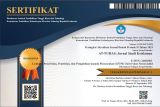Abdullah, T. (2018). Teologi Rasional: Pemikiran Muhammad Abduh. Riwayat: Educational Journal of History and Humanities, 1(2). https://media.neliti.com/media/publications/343497-teologi-rasional-pemikiran-muhammad-abdu-5bef9ce5.pdf
al-Banna, H. (1980). Aqidah Islam. Mesir.
Al-‘Akbary, I. B. (t.th). Al-Ibanah ‘an Syariatil Firqatin Najiyyah wa Mujanabatil Firaq Al-Madzmumah.
Al-Munawar, S. A. (2001). Dimensi-Dimensi Agama. UNISMA Press.
Al-Qurthubi, A.-Q. (t.th). Tafsir al-Jami’ li al-Ahkam,. Dar al-Fikr.
Al-Syubki, A. (1961). Al-Madrasah wa al-Tarbiyah wa Idarah al-Shufuf. Muasasah Dar Al-Maktabah wa Al-Hayah.
Al-Walid, A. B. M. bin. (t.th). Ath-Thurthusyi, Siraj al-Muluk. Dar al-Fikr.
Arifin, A. S. (t.th). Risalah Tauhid. Sukorejo.
asy-Syaibi, asy-S. (1992). Ash-Shilah Bain at-Tasawwuf wa at-Tasayyu’. Dar al-Andalus.
Atha’illah, I. (1872). Al-Hikam. Al-Hidayah.
Azra, A. (1999). Jaringan Ulama Nusantara. LKiS.
Beyer, P. F. (1997). Privatization and the Public Influence of Religion in Global Society” dalam Mike Featherstone (ed.) Global Culture: Nationalism, Globalization and Modernity. SAGE Publications.
Chittick, W. (2000). Sufism: A short introduction. Oneworld Publications Limited.
Fahru, F. F. (2020). Melacak Kedalaman Tasawuf Modern Hamka di Tengah Arus Modernitas. JURNAL PENELITIAN KEISLAMAN, 16(2), 129–142. https://doi.org/10.20414/jpk.v16i2.2327
Falah, R. Z., & Farihah, I. (2015). Pemikiran Teologi Hassan Hanafi. Fikrah: Jurnal Ilmu Akidah Dan Studi Keagamaan, 3(1). https://journal.iainkudus.ac.id/index.php/fikrah/article/viewFile/1833/1601
Farhan, F., & Amaliyah, A. (2016). ISLAM DAN TASAWUF DI INDONESIA : KADERISASI PEMIMPIN MELALUI ORGANISASI ‘MATAN.’ Esoterik, 2(1). http://repository.iainkudus.ac.id/1337/
Farida, M. (2011). Perkembangan Pemikiran Tasawuf dan Implementasinya di Era Modern. Substantia: Jurnal Ilmu-Ilmu Ushuluddin, 13(1). http://dx.doi.org/10.22373/substantia.v13i1.4816
Ghazali, A.-I. (1992). Ihya’ Ulum ad-Din. Dar al-Fikr.
Herawan, B. (1993). Pasang Surut Aliran Tasawuf. Mizan.
Imron, A. (2018). Tasawuf dan Problem Psikologi Modern. Jurnal Pemikiran Keislaman, 29(1), 23–35. https://doi.org/10.33367/tribakti.v29i1.561
Islam, D. R. E. (1993). Ensiklopedi Islam. PT.Ichtiar Baru Van Joeve.
Komarudin, D. (2019). Konsep Tasawuf Modern dalam pemikiran Nasaruddin Umar. Syifa Al-Qulub, 3(2). http://digilib.uinsgd.ac.id/22060/
Mahasin, A. (1989). Abangan Santri Priyayi dalam Masyarakat Jawa. Pustaka Jaya.
Mannan, A. (2018). ESENSI TASAWUF AKHLAKI DI ERA MODERNISASI. Aqidah-Ta : Jurnal Ilmu Aqidah, 4(1). https://doi.org/10.24252/aqidahta.v4i1.5172
Mansoer, M. (2020). PEMIKIRAN TEOLOGI DALAM TAFSIR DEPARTEMEN AGAMA. Ushuluna: Jurnal Ilmu Ushuluddin, 2(2). https://doi.org/10.15408/ushuluna.v2i2.15178
Mawardi, U. M. (2007). Pemikiran Teologi Al-Maturidi. AL-FATH, 1(1). http://dx.doi.org/10.32678/alfath.v1i1.3240
Mu’in, M. T. T. A. (1986). Ilmu Kalam. Bumirestu.
Najib, M. A. (2018). EPISTEMOLOGI TASAWUF MODERN HAMKA. Jurnal Dinamika Penelitian, 18(2). https://doi.org/10.21274/dinamika.2018.18.2.303-324
Nasution, H. (1982). Pembaharuan dalam Islam: Sejarah pemikiran dan gerakan. Bulan Bintang.
Nasution, H. (2010). Filsafat Dan Mistisme Islam. Bulan Bintang.
Rahmat, J. (1991). Islam aktual: Refleksi sosial seorang cendekiawan muslim. Mizan.
Romli, I. M. (t.th). Membumikan Aswaja Di Era Globalisasi. NU Center PWNU Jawa Timur.
Said, E. W. (1995). Orientalism: Western conceptions of the orient (Reprinted with a new afterword). Penguin Books.
Sirriyeh, E. (1999). Sufis and anti-Sufis: The defense, rethinking and rejection of sufism in the modern world. Curzon.
Syarifuddin, S. (2012). Konsep Teologi Hasan Hanafi. Substantia, 14(2). https://jurnal.ar-raniry.ac.id/index.php/substantia/article/view/4873#:~:text=http%3A//dx.doi.org/10.22373/substantia.v14i2.4873
Washil, I., & Fata, A. K. (2018). PEMIKIRAN TEOLOGIS KAUM SALAFÎ: Studi atas Pemikiran Kalam Ibn Taymiyah. ULUL ALBAB Jurnal Studi Islam, 19(2), 315–342. https://doi.org/10.18860/ua.v19i2.5548
Zahro, A. (2004). Tradisi intelektual NU: Lajnah Bahtsul Masa’il, 1926-1999 (Cet. 1). LKiS.
 (Universitas Ibrahimy, Situbondo)
(Universitas Ibrahimy, Situbondo) 




.png)






